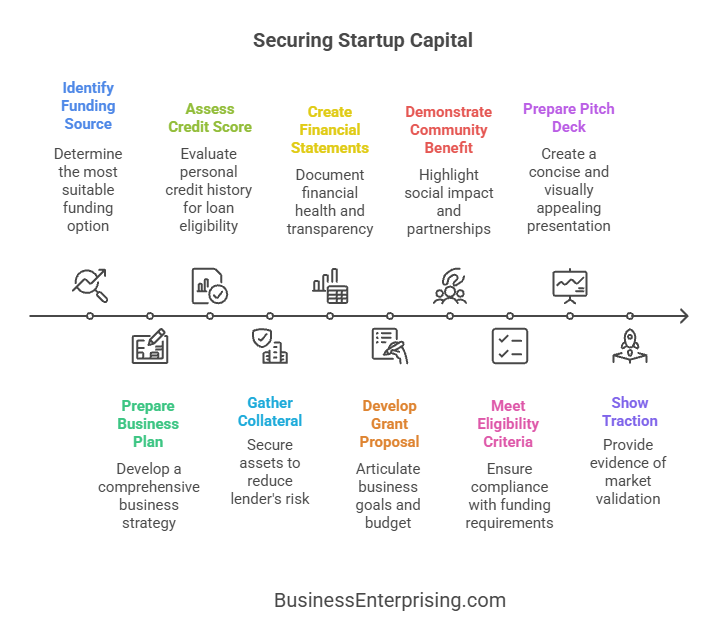 Securing startup capital is a critical step for any entrepreneur looking to launch and grow a business. Whether seeking a small business loan, a grant, or investment from private investors, understanding the specific requirements and expectations involved is essential. Below you’ll find the typical business funding requirements for these different sources and provides insights on what entrepreneurs need to prepare to secure the necessary capital.
Securing startup capital is a critical step for any entrepreneur looking to launch and grow a business. Whether seeking a small business loan, a grant, or investment from private investors, understanding the specific requirements and expectations involved is essential. Below you’ll find the typical business funding requirements for these different sources and provides insights on what entrepreneurs need to prepare to secure the necessary capital.
Small Business Loans
Small business loans are a common way for entrepreneurs to obtain startup capital. Financial institutions such as banks and credit unions provide these loans based on specific criteria. One of the primary business funding requirements for a small business loan is a well-prepared business plan. This document should outline the business concept, market analysis, marketing strategy, operational plan, and financial projections. Lenders want to see a clear roadmap to profitability and an understanding of the market dynamics.
In addition to a comprehensive business plan, a good credit score is essential. Lenders assess the personal credit history of the business owner to gauge creditworthiness and the ability to repay the loan. Entrepreneurs with higher credit scores are more likely to secure favorable loan terms and lower interest rates. Additionally, having collateral can significantly enhance the chances of loan approval. Collateral serves as a security for the loan, reducing the lender’s risk in case of default. Common forms of collateral include real estate, equipment, or inventory.
Another critical requirement is a detailed financial statement. Lenders will scrutinize the entrepreneur’s financial health, including personal and business income, expenses, and assets. A well-documented financial statement demonstrates financial responsibility and transparency. Furthermore, lenders often require a certain amount of equity investment from the entrepreneur. This investment shows the lender that the business owner has a vested interest in the success of the venture.
Grants
Grants are an attractive funding option for startups because they do not require repayment. However, securing a grant can be highly competitive and requires meeting specific criteria set by the grant provider. Most grants are offered by government agencies, non-profit organizations, and private foundations. The first step in securing a grant is identifying the right grant opportunities that align with the business’s mission and objectives.
A compelling grant proposal is crucial for success. The proposal should clearly articulate the business’s goals, the problem it aims to solve, and how the grant funds will be used to achieve these objectives. It should also include a detailed budget outlining how every dollar of the grant will be spent. Grant providers look for well-thought-out plans that demonstrate the potential for significant impact.
Additionally, many grant providers require proof of community benefit or social impact. Businesses that contribute to economic development, create jobs, or address social issues are often given priority. Supporting documentation, such as letters of support from community leaders or partnerships with other organizations, can strengthen the grant application.
Entrepreneurs must also ensure compliance with all eligibility criteria. This may include specific industry requirements, geographic restrictions, or the size and stage of the business. Meeting these criteria and providing all requested documentation can enhance the chances of securing a grant.
Private Investors
Private investors, including angel investors and venture capitalists, are another key source of startup capital. These investors provide funding in exchange for equity ownership in the company. Understanding what private investors expect is crucial for attracting investment. Business funding requirements for investors are as follows:
One of the primary expectations is a robust business plan. Investors want to see a clear vision, a strong value proposition, and a detailed strategy for achieving business goals. Investors also look for a scalable business model with the potential for significant returns on investment. They want to understand how the business plans to grow and capture market share. This includes identifying target markets, customer acquisition strategies, and competitive advantages. Demonstrating a deep understanding of the market and the potential for scalability is essential.
Another important aspect is the management team. Investors place a high value on the experience, skills, and track record of the founding team. A strong team with relevant industry experience and a history of successful ventures can instill confidence in investors. Highlighting the qualifications and achievements of key team members can strengthen the investment proposition.
Financial projections are also critical for private investors. They want to see realistic and achievable revenue and profit forecasts. Detailed financial projections should include assumptions, revenue streams, cost structures, and anticipated growth rates. Transparency and accuracy in financial projections can build trust with investors.
Private investors often seek proof of traction. This may include customer testimonials, early sales, partnerships, or user engagement metrics. Demonstrating that the business has gained some traction and market validation can significantly enhance its appeal to investors. Additionally, a well-prepared pitch deck is essential for presenting the business to investors. The pitch deck should be concise, visually appealing, and highlight the key aspects of the business plan, market opportunity, and financial projections.
Conclusion
Securing startup capital requires thorough preparation and a deep understanding of the specific requirements for small business loans, grants, and private investments. Entrepreneurs must present a compelling business plan, demonstrate financial responsibility, and showcase the potential for growth and impact. Whether applying for a loan, seeking a grant, or attracting private investors, meeting these requirements can significantly enhance the chances of obtaining the necessary funding.
In conclusion, the journey to securing startup capital is challenging but achievable with the right approach. By understanding the business funding requirements of lenders, grant providers, and investors, entrepreneurs can tailor their strategies and presentations to meet these criteria. As the business landscape continues to evolve, staying informed and adaptable will be key to navigating the complexities of funding and achieving entrepreneurial success. Through diligence, strategic planning, and effective communication, businesses can secure the capital they need to launch, grow, and thrive.


